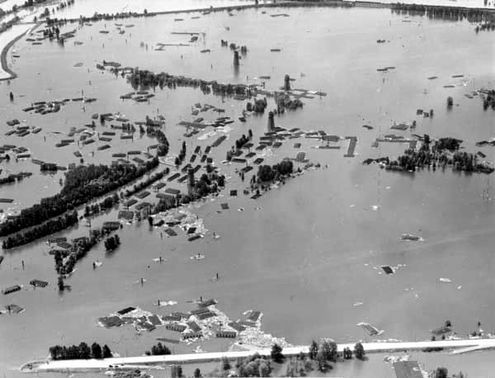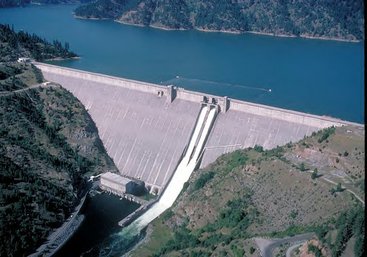The Pacific Northwest has a tremendous opportunity to modernize the 50-year-old U.S.-Canada Columbia River Treaty to benefit people, fish and wildlife.
On May 30, 1948, the Columbia River flooded, wiping out the entire city of Vanport, Oregon. This massive flood decimated a city and spurred negotiations between the United States and Canada to prevent a future catastrophe. The result was the U.S.-Canada Columbia
On May 30, 1948, the Columbia River flooded, wiping out the entire city of Vanport, Oregon. This massive flood decimated a city and spurred negotiations between the United States and Canada to prevent a future catastrophe. The result was the U.S.-Canada Columbia
|
River Treaty, which was ratified in 1964. The treaty led to the construction of four dams in the Columbia River Basin: three dams in Canada and one dam in Montana. The treaty addresses the rights and obligations of both nations with regard to flood control and hydropower. The needs and river’s ecosystem were not considered.
Pacific Rivers, working with tribes and First Nations, seeks to add a third provision: Ecosystem-based Function. This third provision would require the U.S. and Canada to manage the river for the benefit of salmon and river health in addition to hydropower and flood control. Modernizing the treaty by including Ecosystem-based Function would improve the river’s ecosystem by restoring more natural flow patterns, reconnecting and restoring floodplains, which not only help to manage flooding, but which also provide crucial fish habitat. Restoring salmon to the Canadian portion of the Basin is another important element of Ecosystem-based Function. |
|
Under the current treaty, the joint flood risk management provision is set to expire in 2024. If the treaty isn’t renegotiated, the expiration of joint flood control could upend operations critical to fish migration. If this provision is allowed to lapse, the U.S. Army Corps of Engineers must demonstrate that is has effectively used all U.S. storage capacity for system flood control before it can “call upon” Canadian reservoirs for additional flood storage. Proceeding with this type of flood risk management may require larger and more frequent drawdowns at Lake Roosevelt and perhaps at all U.S. storage reservoirs, including non-treaty dams such as Dworshak and Brownlee. Such operations would limit system capability to provide needed spring and summer flows for salmon and would likely impact other river uses, such as irrigation.
|
We see the coming deadline as an opportunity to spur negotiations and modernize the treaty to address the needs of the river. Including Ecosystem-based-Function as a third treaty provision will help imperiled salmon runs while still allowing the region to benefit from the flood control and low-carbon source of energy that the treaty dams provide.
If we fail to act or get this wrong, the Northwest’s most iconic river may never look the same. Donate today.
WHY MODERNIZE THE TREATY?
If we fail to act or get this wrong, the Northwest’s most iconic river may never look the same. Donate today.
WHY MODERNIZE THE TREATY?
- The current Treaty has only two purposes: power generation and flood control. The needs of salmon are not addressed.
- If we fail to modernize the Treaty, the U.S. will not be able to maintain its low-cost power, protect against floods, or maintain healthy rivers for fish, wildlife, and people


